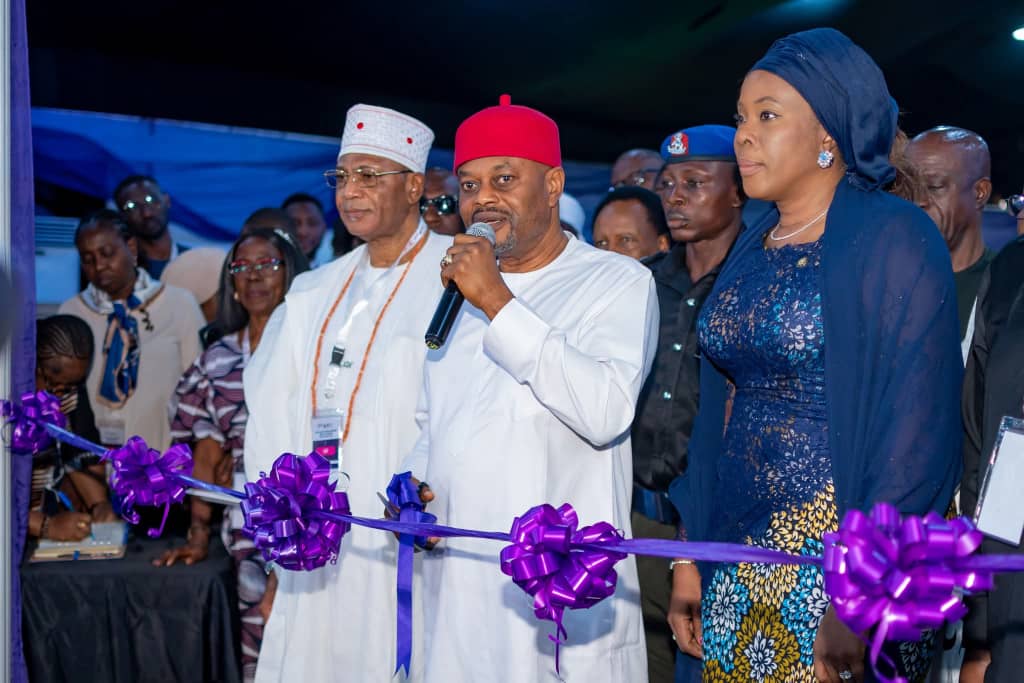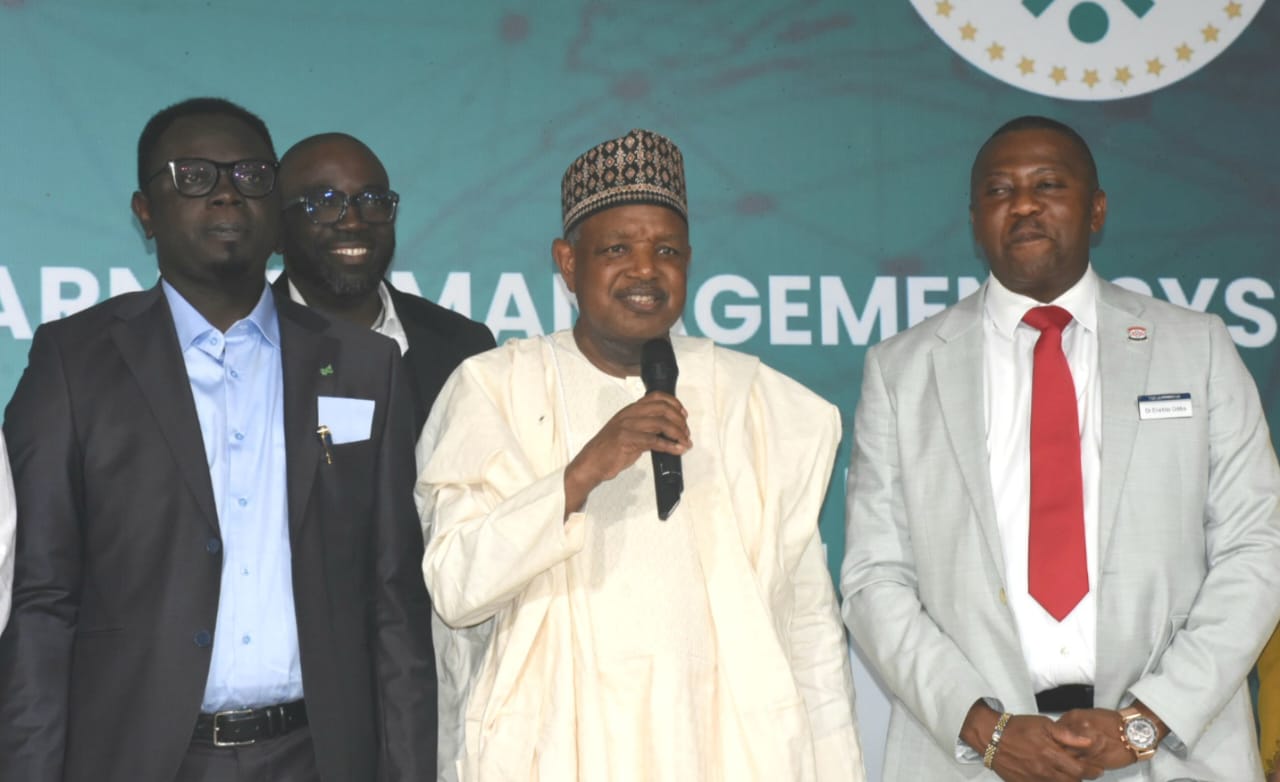Business
Accelerating Sustainable Manufacturing Through Innovation: MAN–RMRDC EXPO 2025 Leads the Way

In a deliberate effort to foster stronger partnerships required to build innovation and sustainability for economic development, stakeholders from across Nigeria’s industrial ecosystem gathered for the 2025 edition of the Nigeria Manufacturing & Equipment/ Nigerian Raw Materials (NME/NIRAM) Expo 2025 at the Balmoral Federal Palace Hotel, Victoria Island, Lagos.
The event, jointly organised by the Manufacturers Association of Nigeria (MAN) and the Raw Materials Research and Development Council (RMRDC), is being heralded as a national milestone in Nigeria’s industrial journey.
With the theme “Accelerating Sustainable Manufacturing Through Cutting-edge Equipment and Technology Solutions,” the three-day event brought together policymakers, industrialists, researchers, financiers, and global partners to tackle Nigeria’s manufacturing challenges head-on and explore paths to self-reliance through innovation-driven production.
The Honourable Minister of Innovation, Science and Technology, Chief Uche Geoffrey Nnaji, while declaring the Expo open, affirmed that for Nigeria to experience industrial development, innovation and technology must be prioritised.
He commended the Raw Materials Research and Development Council (RMRDC) and the Manufacturers Association of Nigeria (MAN) for organising such a timely event.
Chief Nnaji further stated that the Expo provides a strategic platform for inspiring new innovative ideas that are capable of moving the Nigerian manufacturing ecosystem forward. He emphasised that one of the major planks of President Bola Tinubu’s Renewed Hope Agenda is strengthening the capacity and capabilities of Nigeria’s manufacturing industry to innovate and produce products that would significantly reduce the country’s over-dependence on importation.
Earlier in his welcome address, the Director General of RMRDC, Professor Nnanyelugo Ike-Muonso, described the Expo as more than a periodic gathering, but as a strategic platform where Nigeria’s industrial future is debated, designed, and driven.
Prof. Ike-Muonso highlighted that the expo serves as a hub for technical exchange, policy dialogue, investment matchmaking, and strategic industrial networking, critical components in the drive to reduce import dependency and grow domestic capacity.
Citing concerning figures, he noted that over 70% of Nigeria’s manufacturing inputs are imported, with raw material imports surging to ₦4.53 trillion in just the first nine months of 2024. Despite this, the manufacturing sector contributed only 9.62% to GDP in Q1 2025, a drop from the 9.8% recorded the previous year.
“These numbers expose a structural weakness,” the DG stated. “We export raw materials in crude form, import them back refined, and in the process, export jobs and value.”
He emphasised the urgent need for Nigeria to embrace the Fourth Industrial Revolution, integrating smart technologies, adopting resource-efficient processes, and institutionalising sustainability as a national industrial ethos.
Professor Ike-Muonso pointed to RMRDC’s Research and Demonstration Plant Complex (RDPC) in Abuja as a concrete step towards this vision. The RDPC houses over 50 pilot plants, all locally designed and fabricated, transforming indigenous raw materials like cassava, talc, and shea into high-value industrial products.
Prof. Nnanyelugo reiterated the legislative milestone RMRDC has achieved with the bill, which mandates at least 30% processing or value-addition within Nigeria’s raw materials. From cassava to platinum ore, this marks a turning point from exporting raw jobs to nurturing them in our soil.
“This positive development not only makes the challenge of cutting-edge technology for raw material processing both imperative and urgent but holds the ace for providing global investors with the legislative confidence they require to invest in processing technologies and domestic processing of raw materials,” the DG stated.
Delivering his welcome remarks, the President MAN, Otunba Francis Meshioye reinforced the expo’s importance to Nigeria’s industrial policy. He extended warm acknowledgements to dignitaries and partners, including the Honourable Minister of Innovation, Science and Technology, Chief Uche Geoffrey Nnaji, for paving the way for innovation and technology shift in recent times.
Meshioye underscored the need to embrace cutting-edge technologies such as the Internet of Things (IoT) and Artificial Intelligence (AI) to enhance productivity and efficiency in manufacturing processes.
“We are focused on energy-efficient production, smart factory protocols, closed-loop systems, and advanced recycling,” he said. “These approaches not only reduce waste but add long-term value for stakeholders.”
He added that the 2025 Expo was reengineered to align with President Bola Ahmed Tinubu’s “Nigeria First” policy, a call to deepen local content, promote homegrown solutions, and support domestic industry.
In his remarks, the Director General of the Manufacturers Association of Nigeria (MAN), Mr. Segun Ajayi-Kadir, expressed enthusiasm that the three days of exposition and conversation around value chain optimisation shall deliver on economic self-reliance and enhanced industrialisation. He urged participants to get involved at the expo and showcase innovative products and solutions developed by local manufacturers, as well as connect with potential customers, partners, and investors.
He further applauded their presence, which he said demonstrates a commitment to promoting local content and supporting Nigerian industries.
Mr. Kadir stated,” This EXPO also affords us an opportunity to examine the state of the manufacturing sector and to co-create solutions to ameliorate identified challenges.
This is a marketplace of ideas, and we look forward to harvesting innovative solutions to grow the manufacturing sector and develop the Nigerian economy.”
As discussions, exhibitions, and business-to-business engagements unfold throughout the event, both leaders expressed optimism that the NME/NIRAM EXPO 2025 will spark actionable outcomes that reposition Nigeria as a truly industrialised nation.
The NME/NIRAM EXPO 2025 continues through the day, featuring exhibitions, policy panels, innovation showcases, and technical workshops all centered on building a resilient, sustainable, and self-reliant innovative Nigerian manufacturing sector.
Business
FG, Investonaire Academy Unveil National Programme to Equip 100,000 Youths with Financial Skills, Digital Wealth Tools

By Joel Ajayi
The Federal Government, in collaboration with Investonaire Academy, has unveiled a nationwide financial literacy and wealth-building programme targeting more than 100,000 young Nigerians. The initiative is designed to equip participants with practical skills in budgeting, saving, investing, asset building, and long-term financial planning, positioning them for sustainable prosperity in a rapidly evolving economy.
Launched on Tuesday in Abuja, the Honourable Minister of Youth Development, Comrade Ayodele Olawande, described financial literacy as a necessary survival tool for young people confronting today’s economic realities.
He noted that the initiative represents the foundation of a broader vision expected to extend beyond Nigeria to other African nations and global markets.
Reaffirming the Federal Government’s commitment to supporting over 4,000 corps members annually, the Minister said the programme will provide platforms, resources, and skills needed for both job creation and employability.
“The young people who understand money — how to save, invest, build assets, and manage risk — are the ones who will lead Nigeria into prosperity,” he said.
A major highlight of the launch was the expansion of the Nigeria Youth Academy, a digital platform offering mentorship, training, and startup support. According to the Minister, more than 200 startups will receive empowerment through the Academy’s e-app platform before the end of the year.
He stressed the need for deeper collaboration with private organisations, innovators, and youth-focused groups, noting that government alone cannot drive youth development. He further encouraged young Nigerians to embrace skills acquisition, innovation, and digital enterprise, saying these remain critical to reducing the desire for migration and increasing self-reliance.
Outlining the Ministry’s long-term commitments, Olawande emphasized three priorities: supporting youth innovation, equipping them with growth tools, and safeguarding millions of Nigerian youths under the Ministry’s mandate.
Speaking at the launch, Sebastien Sicre, Chief Operating Officer of Investonaire Academy, said the programme was crafted to revolutionize the way Nigerian youths learn and apply financial knowledge. He highlighted the Academy’s gamified Learning Management System (LMS), which offers interactive learning tools, community forums, and real-time mentorship to make financial education engaging and accessible.
Complementing the digital platform is a new 200-square-metre physical training centre in Abuja, opposite the NNPC Towers, where in-person workshops and mentorship sessions will take place.
The curriculum covers key global asset classes — including equities, commodities, forex, and indices — ensuring participants gain a broad understanding of financial markets.
Sicre added that with Federal Government backing, the programme seeks to unlock new opportunities, strengthen youth participation in the digital economy, and reward outstanding participants through a $1 million funding pool to support new and existing ventures.
International Programme Director of Investonaire Academy, Dr. Enefola Odiba, explained that the initiative aims to bridge long-standing gaps in financial education among Nigerian youths. While schools teach many subjects, he said, essential financial skills are often missing.
“Many people can earn money — earning money can be easy. The real challenge is retaining, managing, and growing that money,” he noted.
Referencing the Central Bank of Nigeria’s definition of financial literacy, Odiba stated that implementation remains a major national challenge. He said the initiative brings together government agencies, youth groups, academic institutions, and private-sector partners to translate strategy into measurable impact.
The programme’s curriculum covers budgeting, saving, investing, and financial planning — areas where many young people struggle. By offering practical training, real-world insights, and guided mentorship, the initiative aims to build a generation of financially empowered youth capable of driving innovation, entrepreneurship, and sustainable economic growth.
With this partnership, the Federal Government and Investonaire Academy share a common goal: to empower young Nigerians with the financial intelligence and digital tools needed to build wealth, grow businesses, and transform the nation’s economic future.
-

 Featured6 years ago
Featured6 years agoLampard Names New Chelsea Manager
-

 Featured6 years ago
Featured6 years agoFG To Extends Lockdown In FCT, Lagos Ogun states For 7days
-

 Featured6 years ago
Featured6 years agoChildren Custody: Court Adjourns Mike Ezuruonye, Wife’s Case To April 7
-

 Featured6 years ago
Featured6 years agoNYSC Dismisses Report Of DG’s Plan To Islamize Benue Orientation Camp
-

 Featured4 years ago
Featured4 years agoTransfer Saga: How Mikel Obi Refused to compensate me After I Linked Him Worth $4m Deal In Kuwait SC – Okafor
-
Sports3 years ago
TINUBU LAMBAST DELE MOMODU
-

 News11 months ago
News11 months agoZulu to Super Eagles B team, President Tinubu is happy with you
-
Featured6 years ago
Board urges FG to establish one-stop rehabilitation centres in 6 geopolitical zones
